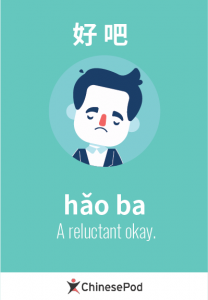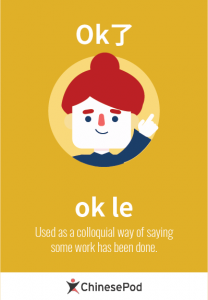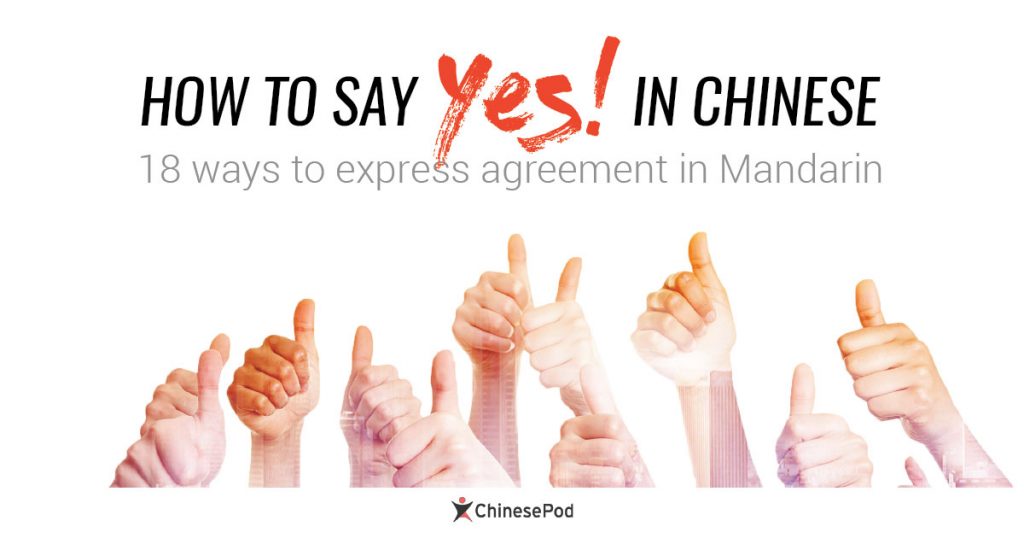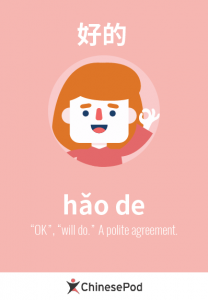How to say ‘YES’ in Chinese? 18 ways to express agreement in Mandarin
How do you say yes in Chinese? In this post, we will teach you 18 ways to express agreement in Mandarin that will make you sound more like a native speaker.
If you’ve just started learning a new language, you probably aren’t yet equipped with a lot of ways to express agreement — the simple “yes” is likely to be your only option. Luckily, there’s no direct equivalent to the English “yes” in Chinese. In this post, we’re going to teach you 18 ways to express agreement in Mandarin that will immediately boost your confidence and make you sound more like a native speaker.
1. 是 – Shì
Used to confirm something. Typically, 是 is used in answers to questions that contain 是.
A: 你是中国人? nǐ shì zhōng guó rén? — Are you Chinese?
B: 是 shì — Yes, I am.
A: 你是不是中国人? nǐ shì bù shì zhōng guó rén? — You’re Chinese, aren’t you?
B: 是 shì — Yes, I am.
Replying with 是 to the question that has a different verb is a much rarer case.
A: 你想去北京吗? nǐ xiǎng qù běi jīng ma ? — Do you want to go to Beijing?
B: 想 xiǎng — Yes, I do.
In some grammatical structures, 是 is used as an auxiliary verb, but it’ll still be used in an answer.
A: 你是在中国学习汉语吗? nǐ shì zài zhōng guó xué xí hàn yǔ ma ? – Do you study Chinese in China?
B: 是 shì — Yes, I do.
There’s also 是的 shì de, which is a very polite agreement that also expresses complaisance to the person you’re talking to. It’s more polite than 是, and more colloquial. The question will still contain 是.
A:这是你给我买的吗? zhè shì nǐ gěi wǒ mǎi de ma ? — Is this the thing you bought for me?
B:是的 shì de — Yes, it is.
2. 对 – duì.
Means “correct” in Chinese. It’s very similar to how “right” is used in English.
3.好 – hǎo
Similar to “good,” “fine,” and “OK.” This is the most common wayof saying “OK” or “good” as an agreement to a request.
4. 好的 – hǎo de
“OK”, “will do.” A polite agreement. You can hear 好的 from hotel staff or a server at a restaurant. It also means “I agree (with you).”
A: 请把我的行李放在我的房间 qǐng bǎ wǒ de xíng lǐ fàng zài wǒ de fáng jiān — Take the suitcase to my room please.
B: 好的 hǎo de — Will do.
5. 好了- hǎo lе
An equivalent of 够了gòu le, meaning “enough.” Can be used in less formal scenarios.
A: 我跟你说了很多次了,不要这么马虎大意!wǒ gēn nǐ shuō le hěn duō cì le , bù yào zhè me mǎ hǔ dà yì — I’ve told you this so many times, you shouldn’t be so careless!
B: 好了,我知道了 hǎo lе, wǒ zhī dào lе — OK (enough), I understand.
6. 好啊 -hǎo a 好呀 – hǎo ya.
“Hell yeah!” This is how you show your friends you’re excited about the suggestion they’ve just made.
A: 今晚去唱KTV吧 jīn wǎn qù chàng KTV ba — Let’s go sing KTV tonight
B:好啊! hǎo a! — Hell yeah!
7. 没错 – méi cuò
“That’s right.” It literally means “you’re not wrong”. 没错 could be translated into Chinese as: 你说对了nǐ shuō duì le (what you said is correct), 没有错误 méi yǒu cuò wù (there’s no mistake).
A: 你是学生吗? nǐ shì xué shēng mа? — Are you a student?
B: 没错 méi cuò — That’s right.
8. 正确 – zhèng què
The kind of “correct” that means that the answer given is the only right answer possible. This expression is frequently used in exact sciences, or when the question asks for an exact number.
A: 中国有56民族吗? zhōng guó yǒu 56 mín zú ma? — Are there 56 ethnic groups in China?
正确 zhèng què — Correct.
9. 好吧 – h ǎo ba
ǎo ba
A reluctant OK. You’re agreeing to something but you’d rather not do it.
A: 明天五点上课 míng tiān wǔ diǎn shàng kè — We’ll have a lesson at 5 o’clock tomorrow.
B: 好吧 hǎo ba — OK.
Bear in mind, that 好吧 isn’t the kind of thing you’d say to your boss. Better respond with 好的.
10. 行 – xíng.
“Will do,” “OK.” This word originates from the verb “to go”. You may have seen this character painted on the green traffic light. It’s also used in the words “bicycle” 自行车 zì xíng chē (literally “self-moving cart”) and “to travel” 旅行 lǚ xíng .
A: 晚上吃火锅可以吗?wǎn shàng chī huǒ guō kě yǐ ma ? — Can we have hotpot tonight?
B: 行 xíng — OK.
There are also 行 variations that are used in Chinese speech: 还行 hái xíng, 行了xíng le.
还行 “OK,” “quite good.” 还好 hái hǎo can have a similar meaning.
A: 这家餐馆怎么样? zhè jiā cān guǎn zěn me yàng? — What do you think about this restaurant?
B: 还行 hái xíng — It’s OK (but I’m not impressed).
行了is similar to 好了hǎo le, and means 够了 “enough.”
11. 可以 – kě yǐ.
“Allowed”, “possible.” Used to give someone permission to do something, often translated as “can” or “may.”
A: 在这里可以抽烟吗 ? zài zhè lǐ kě yǐ chōu yān ma? — Can I smoke here?
B: 可以 kě yǐ — Yes, you can.
可以 and 行 are both words that mean “you can,” so in some cases 可以 and 行 can be used interchangeably.
A: 这样行吗? zhè yàng xíng ma? / 这样可以吗? zhè yàng kě yǐ ma? — Can I do it this way?
12. O k了 – le
k了 – le
Used as a colloquial way of saying some work has been done, or simply to give a positive response.
A: 我们下午去看电影吧? wǒ mén xià wǔ qù kàn diàn yǐng bа — Let’s go watch a movie today after midday.
B: Ok了. — Okay.
A: 你做完作业了吗? nǐ zuò wán zuò yè le ma? — Have you finished your homework?
B: Ok了. — Yes, I have.
13. 有 – yǒu
The literal meaning is “have.” An affirmative response to a question that contains 有.
A: 有蛋糕吗? yǒu dàn gāo ma? — Do you have a cake?
有 yǒu — Yes, we do.
B: 有 is also used as an equivalent of the English “there is” and “there are”.
A: 这个楼有卫生间吗? zhè gè lóu yǒu wèi shēng jiān ma? — Is there a bathroom on this floor?
B: 有 yǒu — Yes, there is.
14. 没问题 – méi wèn tí
“No problem,” “sure.” The literal translation of this expression is “without question.” Avoid informal environments.
A: 我能用下你的手机吗?wǒ néng yòng xià nǐ de shǒu jī ma? — Can I use your cell phone?
B: 没问题 méi wèn tí — No problem.
15. 嗯 ēn
“Um,” “yeah,” “right.” An affirmative interjection. Women tend to use it more often than men. The Chinese use 嗯 or 嗯嗯 ēn ēn especially often when talking to their relatives and friends on the phone.
A: 你明天能来吗?nǐ míng tiān néng lái má? — Can you come tomorrow?
B: 嗯,没问题 ēn, méi wèn tí — Yeah, no problem.
To understand how to pronounce 嗯 and other exclamative particles in Chinese, check out this Chinesepod video: Native Noises.
16. 当然 dāng rán
“Of course,” “certainly.” Similar to this expression is 那当然 nà dāng rán, which is a more informal version of 当然 and means “obviously” or “duh.”
A: 你喜欢中餐吗 nǐ xǐ huān zhōng cān ma? — Do you like Chinese food?
B: 当然 dāng rán — Of course!
17. 确定 què dìng
It’s similar to 当然 and means “of course”, “certainly.”
18. Bonus
Want a bonus way of giving an affirmative response in Chinese? Just follow this simple rule: answer with a predicate used in the question.
A: 这个商店远吗 zhè ge shāng diàn yuǎn ma? — Is this shop far?
B: 远 yuǎn — Yes.
Do you know any other ways of saying “yes” in Chinese that we missed? Or maybe you have a funny story about how you said the wrong kind of “yes”? We’re looking forward to reading your comments.
You might also like:
Elena Ruchko
Latest posts by Elena Ruchko (see all)
- How to say ‘YES’ in Chinese? 18 ways to express agreement in Mandarin - November 10, 2017
- Chinese Humor vs American Humor, and How to Be Sarcastic Using 看起来 - July 26, 2017
- Red Envelope Wars and What Pokemon Go Has to Do with CNY - February 1, 2017



